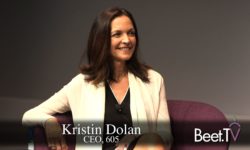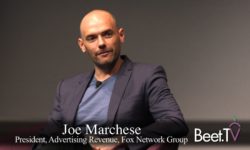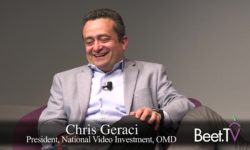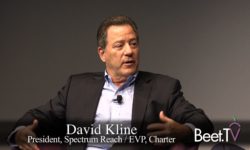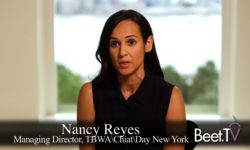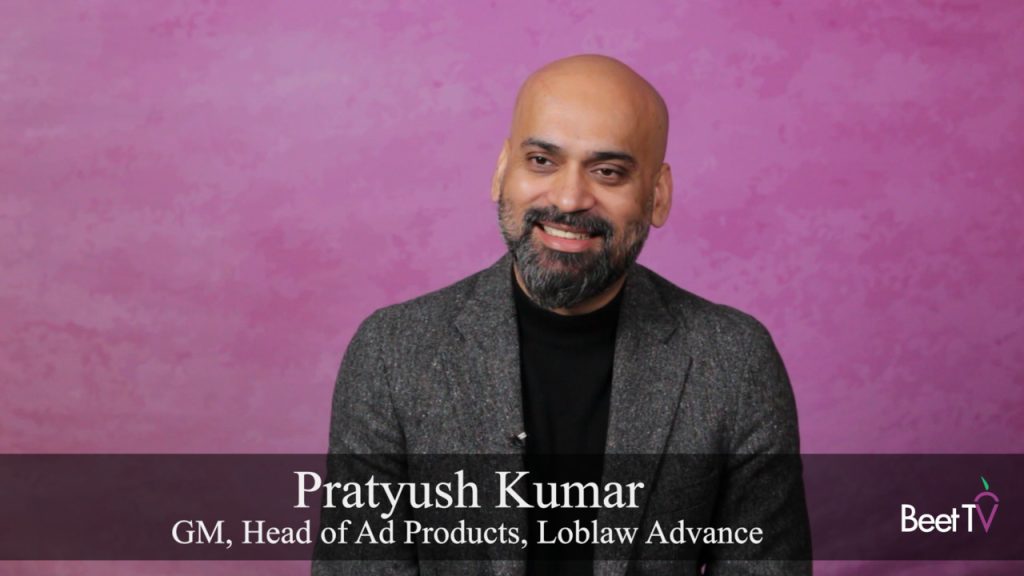Giving people choices when it comes to television advertising sounds pretty straightforward, but it’s complicated by the fact that many viewers want an effortless experience. “This is why voice activation is working so well, because it’s actually the only thing easier than picking up a remote and pressing the buttons,” says Ben Winkler, Chief Investment Officer at OMD.
So while Winkler believes creating a good consumer experience will yield good returns for advertisers, he’s “not as bullish on that as I’d like to be because I kind of feel that most media is still consumed on a passive basis, and people just don’t want to have to make any effort whatsoever.”
In this interview at the recent Beet Retreat in the City, where Winkler was one of several moderators, he also identifies the key challenge of measuring TV ad ROI in response to questions from Beet.TV contributor Ashley J. Swartz, who is CEO of Furious Corp.
According to Winkler, accountability and integrity of data take a back seat to inconsistency. He likens it to what happens to evidence in the police world. “That chain of custody just does not exist. Each piece of data is in a different language, so they just simply can’t connect from piece to piece to piece,” Winkler says.
Consumer choice was one of the key topics as hundreds of Beet Retreat attendees gathered at the Luce Auditorium at Meredith Corporation in Manhattan for an event titled Television Advances as Consumers Choose. After a welcome from Meredith Video SVP Andrew Snyder, the sharp-witted Rob Norman took to the stage as moderator and quantified his own attention span now that he’s retired from GroupM. “My girlfriend told me not to look out the window all morning, because you’ll have nothing to do in the afternoon.”
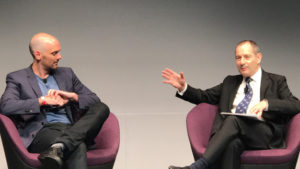
Norman was joined on the dais by Fox’s Joe Marchese, who is no stranger to irreverent discourse. The founder of true[X] discussed proper commercial lengths and what constitutes ad effectiveness before addressing what he see as the bigger problem of attribution—specifically, the “bullshit of some of the attribution methods out there. The math just doesn’t add up.”
Asked by Norman how TV providers can increase the supply of coveted ad inventory, Marchese responded, “You don’t. You get better with the supply you have.” The only real currency for transacting, according to Marchese, is attention. “Engagement is proof of attention.”
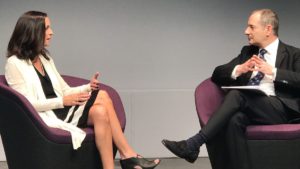
Next on stage was Kristin Dolan, co-founder of TV data analytics firm 605, which was formed in 2016 to parse set-top box data for the benefit of programmers and advertisers and recently launched its Impact Index. Rather than focus solely on sales results, Impact Index is a scientifically-based approach for measuring the impact of TV advertising on both branding and sales.
Dolan described the work 605 has done for clients like Walmart, which conducted a “reputational ad campaign” with no specific call to action. According to Dolan, among people who were exposed to the campaign ads, attribution metrics showed that their in-store spending increased along with their affinity for the Walmart brand.
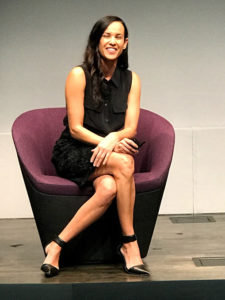
Nancy Reyes, Managing Director, TBWA/Chiat Day/NY, presented three visual case studies centered on “data empowering creativity,” labeling them Bionic Creative, Data As Content and Data As A Canvas. For Bionic Creative she cited a campaign by postal authorities in the Netherlands that induced the general public to send Christmas cards to some 230,000 people who were deemed to be “lonely” based on the amount of mail that they did not receive. Data As Content was exemplified by an out-of-home campaign that sought to reduce Finland’s world-leading domestic violence statistics by publicizing them in the hopes that more people would report abuse. For Data As A Canvas, Reyes walked the audience through a campaign for the New York return of the Grammy Awards that used an Uber car outfitted with augmented reality to “create” music based on pedestrian activity.
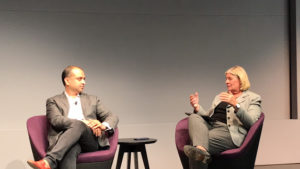
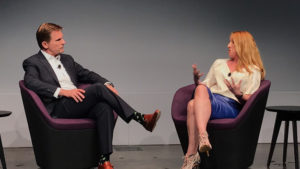
Under questioning by Furious Corp.’s Swartz, Walt Horstman of TiVo said one positive sign in the advancement of data-informed TV advertising is that “digital teams within agencies are taking a leadership role” and that they don’t see themselves bound by the ways TV has been bought and sold for a half century.

605 Co-Founder Ben Tatta was joined by David Kline of Charter Communications and Spectrum Reach in a discussion about the rise of addressable linear TV. “We’re further along but we’re not far enough along,” said Kline, who noted that this week Charter launched household addressable in the Los Angeles market. He predicted that cable companies and networks will engage in more collaboration going forward to increase the national addressable footprint.
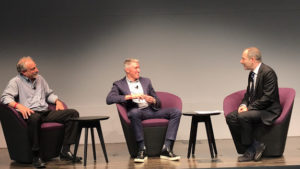
For buy-side dialogue, Norman asked Dentsu Aegis Group’s Doug Ray and GroupM’s Lyle Schwartz about the progress in moving to new measurement currencies. “The best experience will win,” is how Ray summed things up. “The ad industry that I joined is not here today,” said Schwartz. “It will evolve. It may not be dead but it may be on life support in 20 years.”
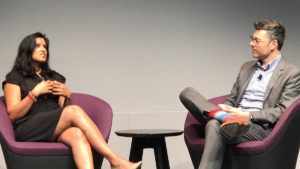
OMD’s Winkler dubbed true[X] “the platypus of advertising” before its new President, Pooja Midha, explained how “engagement is a perfect impression” while noting “We operate in a business that has for many, many years transacted in a couple of very specific metrics.”
Winkler then welcomed Chris Geraci on stage and asked the Omnicom Media Group veteran about this year’s Upfront market. “There are more moving parts than ever,” Geraci responded, with dollars “shifting in many ways away from linear TV.” He identified as pricing factors a strong economy and a significant increase in TV spending by some brands.
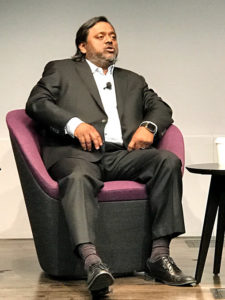
Norman’s setup for his talk with IBM’s Babs Rangaiah about blockchain was his own definition of the technology, likening it to “teenage sex…everyone’s talking about it but no one’s doing it.” Rangaiah’s view: “It’s everything you don’t understand about finance and everything you don’t know about computers combined.” On a more serious note, Rangaiah described his work for his former employer, Unilever, on using blockchain to help rein in media-buy discrepancies, a topic he will showcase at the upcoming Cannes International Festival of Creativity.
To top off the proceedings, GroupM’s Phil Cowdell gave an emotionally vivid presentation with slides and video footage chronicling the aftermath of Hurricane Maria and how he and others in the ad industry have been helping the survivors put their lives back together. “Problems can seem so enormous,” said Cowdell, suggesting that people use the word “dot” to help them focus: “Do one thing,” he advised. “There’s so much more to do.”
Cowdell was followed by Olga Ramos, President of the Boys & Girls Clubs of Puerto Rico, who described herself as being “in the business of providing hopes and opportunities for our kids” to help break the cycle of poverty. “I’m not asking donations. I’m asking for investments,” Ramos said. During a reception that followed, an auction was held to raise additional funding for hurricane victims under the auspices of Stand By Puerto Rico.
This video was produced at the Beet Retreat in City & Town Hall on June 6, 2018 in New York City. The event and video series are presented by LiveRamp, TiVo, true[X] and 605. For more videos from the series, please visit this page.








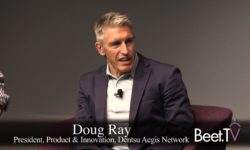


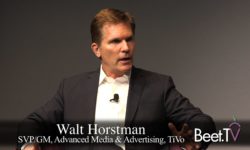
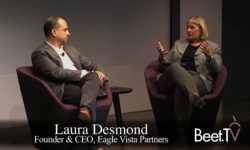
![true[X]’s Midha Revels In Vogue For Lower Ad Load](https://www.beet.tv/wp-content/uploads/2018/06/thumbnail-55-250x150.jpg)
